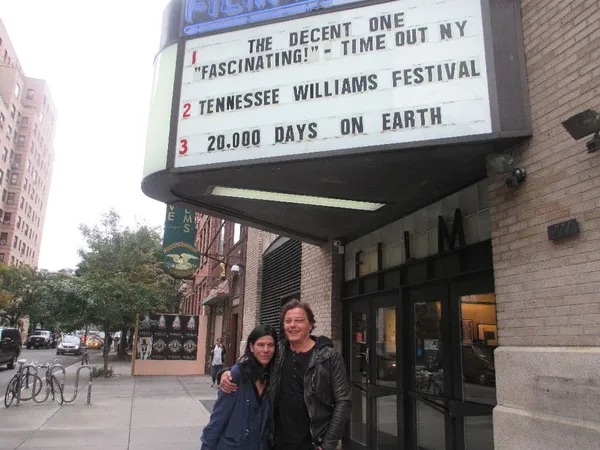Vanessa Lapa's The Decent One (Der Anständige) is evocative and complex with the horror of disconnect, impossible to dismiss as it plays out. In New York, with producer Felix Breisach, we discussed the casting of letter and diary readers Tobias Moretti as Heinrich Himmler, Sophie Rois, Antonia Moretti, Lenz Moretti, Florentín Groll and Lotte Ledl as the Himmler family. We spoke about Marlene Dietrich singing as a marker of time, if Hannah Arendt's Banality of Evil works here and how the writings were obtained, transcribed and put on film.
Based on previously unseen family diaries, photographs and private letters found in Himmler's home in Gmund in 1945 by the US Army, Lapa's documentary sheds harsh light on the Reichsführer-SS, Chief of German Police and Minister of the Interior as a private man.
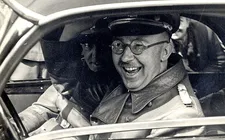 |
| Heinrich Himmler: "Himmler is such a coward, the negative side of a businessman is precisely what he is." |
Anne-Katrin Titze: I found the sound design of your film most astonishing. The footsteps and the gunshots, all the sounds you chose to recreate to accompany the archival footage leave a strong impact. Tell me about your decision making regarding the sound.
Vanessa Lapa: Finally!
Felix Breisach: Finally someone who loves it!
VL: Well, finally someone who understands that there was a lot of reflection behind it. And it was a well-reflected decision we took for a few reasons. One is to be in line with the faithfulness to the text and to the image. Obviously the reason that the footage is silent is not because it was silent in 1914 in the streets of Munich. But because there was no technology in 1914 to record the sound. And the other reason is to allow the viewer a cinematic experience that engages him to bring him into the intimacy of the life of Himmler and his family.
And the third reason, which may sound ironic but is really not, is to pull back from any overdramatic emotion manipulation. For example, in the slaughter pit scenes, the gunshots - this is to be true to what the people there were hearing. It would have been way more dramatic to have amazing emotional music on this silent footage. This is according to my view of filmmaking more manipulative than to have it bold and factual.
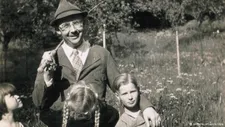 |
| Heinrich Himmler family: "The historical events are there but it's more about a family story, a human story..." |
AKT: Let's talk about your choice of voices. Tobias Moretti as Himmler is fantastic. I remember seeing him a long time ago as Troilus in a theater production of Troilus and Cressida.
FB: For the casting, we thought we should find somebody who is able to speak the language in the right way. His old father [Gehbard Himmler] is Florentín Groll and his mother Anna is Lotte Ledl, they are all actors from the Burgtheater in Vienna, very well known actors in Austria.
AKT: I like how you can hear a different era in the voices. The rhythm is different.
FB: Yes, Florentín Groll is in his seventies and because of the theater tradition we have there, they know how to speak in those old voices. Actually the casting was quite easy. Moretti was a fabulous Hitler [in the 2005 TV Mini-Series Speer Und Er].
VL: It comes back to the concept. We knew that we would like the [voice of the] daughter of Himmler, which was the best case scenario, be the real daughter of the actor. We were very focused on the age, the accent, the ability of entering a character and remain truthful to the text.
 |
| Himmler family artifacts: "I wanted to leave as much space as possible for the diaries and the letters." |
AKT: Antonia Moretti, who is the voice of Himmler's daughter Gudrun, does not have that Burgtheater voice. She sounds very much of today. That makes for an interesting time travel bridge in the voices alone. You decided to be very brief with historical background. Can you talk a bit about your structuring of the film?
VL: Yes. The choice of being very brief, because on the one hand, I counted on the general knowledge of the viewer that is going to see the film. So, giving the basics felt to me is maybe enough and I wanted to leave as much space as possible for the diaries and the letters. To allow the viewer to enter slowly but surely the intimacy into the life of Himmler, his parents, his family, his subordinates. The historical events are there but it's more about a family story, a human story, than a history lesson.
AKT: Some of the juxtapositions are difficult to stomach - I am sure that was your intention. One moment his wife calls Himmler "you naughty man" in a flirtatious letter and in the next we hear that SS members had to present their family tree back to 1750. The viewer is positioned in between which produces a strong emotional effect of constant surprise and unease.
Marlene Dietrich sings a song about Unter Den Linden.
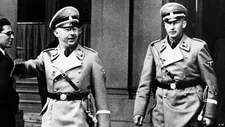 |
| Heinrich Himmler with Reinhard Heydrich: "Himmler wasn't a yes-man. He was also a decision thinker and maker." |
VL: Thank you. This is indeed what we tried to do. To position the viewer between the two poles of the familiar and the uncomfortable empathy, not sympathy and horror. The viewer is constantly between hearing Marlene Dietrich and feeling that he is in Berlin in the 1920s and enjoying and suddenly he gets the totally other pole and he gets uncomfortable that he enjoyed the previous minutes. This is the balance we tried to keep.
AKT: What is the backstory of the letters and how you got into their possession? I read that your father bought the letters?
VL: The backstory is less sexy than it appeared in the press. The documents were stolen in 1945 from the [Himmler] house in Gmund. There is a gap of 15 years where we never knew exactly. A flea market in Belgium - a flea market in Los Angeles - Mexican border - whisky …
AKT: Sounds sexy enough.
VL: Yes, but the thing is that there is no one to tell the story. It's all assumption. Everyone is dead. The soldiers who took it, I don't think they realised what it was. In the early sixties [the collection of documents] was in the hands of Chaim Rosenthal, an Israeli Jew, who kept them under his bed for forty years. On the one hand, obsessed with it, on the other, doesn't really know what to do with it.
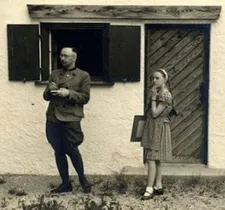 |
| Heinrich Himmler with daughter Gudrun: "I hope she sees the film and will tell me what she thinks about it." |
In 2006, his son convinced him to give it out to someone who will do something important with it. His son was studying at the Tel Aviv University, so he spoke with a professor who knows me from the news and he gave me a call. So this is how the story came to me. And Rosenthal sold - there was a symbolic price to the collection - and indeed my father was the one who paid for it and then gave it to the production company to do a film.
AKT: What was your reaction when you first read the diaries and letters?
VL: It took a while. The first reaction was disgust and curiosity and some attraction and then it took me a few weeks to decide if I will do it. And then I spent a year trying to understand how they came from Gmund to Tel Aviv. Most of the collection is written in Suetterlin Deutsch [the old German handwriting style], so I couldn't understand it. So it was transcribed and then translated into English and Hebrew. So it was coming in in parts. There was a whole team transcribing and translating. I can't say what I felt reading everything because I didn't read everything at once.
AKT: It is very interesting that it came to you in waves. Maybe that also shows in the film. The film also comes at the spectator in waves.
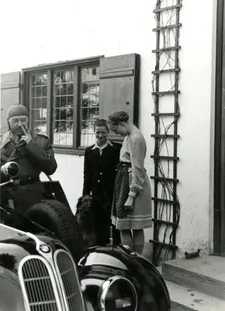 |
| Himmler family: "To position the viewer between the two poles of the familiar and the uncomfortable empathy, not sympathy and horror." |
VL: Yes, probably. You can start to predict when you get to know a character that in the next wave I get he won't be much different and still over and over again I felt shocked. It drove me crazy to realise that again he is saying something and perverting the whole concept of it into something totally cruel and murderous.
AKT: Hearing these letters, you don't even know how much of it he actually believed himself. They contain such basic betrayals of his mistress [Hedwig Potthast voiced by Pauline Knof] and his wife. He often sounds like a businessman. He doesn't come across as an unusual man.
VL: Of course not. He is totally a usual man. This is the danger. It's really reflecting how I feel, you know, the businessman part. It's not in the film unfortunately, because there are no writings in his words about it. The secret negotiations that he did at the end. If I could do a fiction film, the last scene would be Himmler, the businessman coming home from the East with a suitcase filled with Jews that he would exchange.
With all this big ideology, at the end of the day, he was willing to save Jews in order to make a deal with the allies. It's pure business. There is no ideology, there is no passion, there is no truth. At least Goering, Goebbels, Hitler, they went until the end. They believed in it and in a way took the responsibility for it and committed suicide. Himmler is such a coward, the negative side of a businessman is precisely what he is.
AKT: This is very far from a Banality of Evil. Nothing about this behavior I would call banal.
VL: There is nothing banal in it. I am not a Holocaust passionate. But I'm reading since I'm very young and I've been reading Hannah Arendt and I never agreed with her. I've been reading Heidegger. I don't agree with the Banality of Evil. I think there is a big difference between Eichmann and Himmler. I can understand how one can come to the conclusion of the Banality of Evil with a character like Eichmann who was at the end of the day a yes-man. Himmler wasn't a yes-man. He was also a thinker and decision maker.
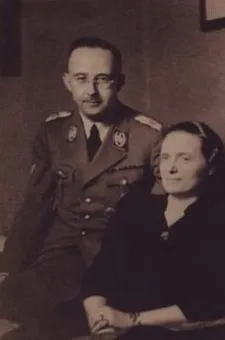 |
| Heinrich and Marga Himmler. In letters she calls him "you naughty man." |
AKT: 7 pounds, 200 grams. You start with the weight of baby Himmler. The backstory, his father being a teacher and Prince Heinrich of Bavaria his godfather, this link to ordinary family histories and the details you provide, how did audiences react to these? Your film was at the Berlin Film Festival and at the Munich Film Festival, which is closest to many of the locations shown from the Tegernsee to the Feldherrenhalle. And then you also showed it at the Jerusalem Film Festival, where it won the prize. What were the different reactions like?
VL: I can't give you an overview, yet. Funny enough, there was a big difference between Munich and Berlin. Munich was way more receptive in a positive way than Berlin. Although Munich is closer to it, they received it much better. Berlin was very disturbed by it. Not all people, but there were people who felt that it was not fair to show a film like this because you only show one side, and not everyone was a Nazi, and not everyone who had the background that Himmler had became a Nazi, and that he was not human.
AKT: That he was not human?
VL: That Himmler is not a human being and that I portrayed him as a human being. Somebody said, "my father is a human being, Himmler is not a human being."
AKT: You hit right into the heart of things!
VL: In Israel, the reactions are surprisingly good. There were a few reactions of Holocaust survivors that were very supportive.
AKT: In the end we hear the interrogator ask Marga Himmler why she didn't ask her husband about the concentration camps. She says "I don't know."
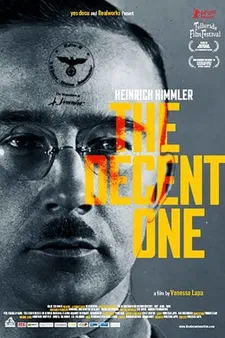 |
| The Decent One poster |
VL: The point of the film is really - ask questions. For me this is a point that is way wider than the family and Germany. The whole world knew. America knew. They bombarded Dresden but they didn't bombard the railway to Auschwitz. She says she doesn't know. This is where you should have known. You should have asked enough questions. Not because you are the wife, but because you are a human being. Ask and be aware.
AKT: We constantly make decisions of what we don't want to know.
VL: Exactly.
AKT: Did you work with Katrin Himmler [Heinrich's niece]?
VL: Yes. Katrin had been a partner from day one. She is the one who transcribed most of the content.
AKT: Did you get in touch with Gudrun, Himmler's daughter?
VL: I tried since day one. I dream of meeting her. The answer was no. The answer is still no. I would love for her to see the film. Unfortunately, she doesn't really like me because I do not fit the criteria. The thing she is not willing to do is become a public figure. The whole journalistic world is interested in these stories every few months. She doesn't want to give interviews. So this has nothing to do with me being a Jew. I hope she sees the film and will tell me what she thinks about it.
AKT: And write you a letter.
VL: I sent her five, six letters in the beginning. The first two letters she didn't believe we had her diary and then she just didn't answer.
The Decent One will be screened on November 12 at the UK Jewish Film Festival.








